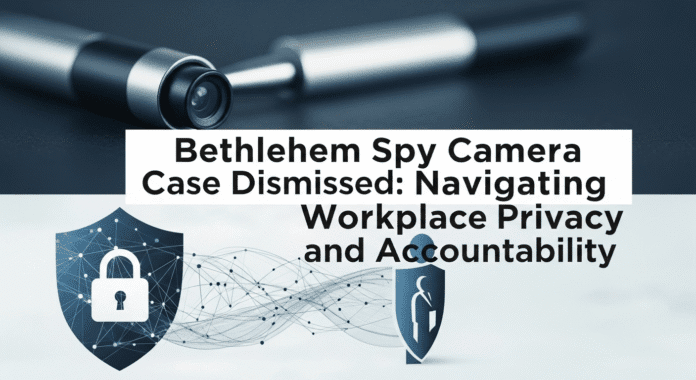What Does the Dismissal of the Bethlehem Spy Camera Case Mean for Workplace Privacy and Accountability?
By David LaGuerre
The dismissal of the controversial spy camera case in Bethlehem—a case that accused a seal-coating business owner of hiding a camera beneath a worker’s desk—prompts a critical question: does this decision set a new precedent for workplace privacy protections or signal a weakening of accountability standards in our local communities? The verdict, now officially dismissed, has spurred debates about privacy rights, employer accountability, and community trust.
Unpacking the Incident: What Really Happened?
In a case that captured local media attention, a business owner in Bethlehem was accused of concealing a spy camera under a worker’s desk, an allegation that resonated with broader concerns about employee privacy and personal autonomy in the workplace. The dismissal of the case has left many asking why such serious allegations did not result in legal consequences and what the implications are for labor rights in the region.
Investigative reports from sources including local news segments and legal analysis pieces by NPR have shed light on the sequence of events. According to these accounts, the allegations hinged on disputed interpretations of workplace protocol and the evidence brought forward was deemed insufficient to sustain a prosecution. As a result, the case was dismissed, raising questions among privacy advocates about whether this outcome sufficiently protects workers or inadvertently downplays employer responsibility.
Navigating the Legal and Ethical Dimensions
The dismissal of the Bethlehem spy camera case brings into focus a complex intersection of legal interpretation, ethical expectations, and workplace dynamics. Legal experts note that in the absence of robust evidence or clear statutory violations, decisions like this one underscore the challenges faced by prosecutors when balancing employer rights with worker privacy. Nonetheless, the outcome has ignited debate among labor groups and privacy advocates.
Critics argue that dismissal may inadvertently signal a lax approach to safeguarding employee rights, potentially emboldening unscrupulous employers to push the boundaries of surveillance in the workplace. On the flip side, supporters of the ruling contend that it reinforces the importance of concrete evidence before subjecting individuals and companies to punitive measures. Academic discussions at institutions like the Brookings Institution and articles in major newspapers underscore the need to reexamine legislative protections in an era when digital surveillance is increasingly normalized in both public and private settings.
As we consider the broader social implications, it is clear that the dismissal has far-reaching effects. It forces policymakers to confront whether existing legal frameworks are adequate to tackle workplace privacy issues in a digital age, or if new, more stringent guidelines are necessary to protect employee dignity without unduly burdening business operations.
The Broader Impact on Workplace Privacy and Accountability
A central concern emerging from the dismissal is the potential precedent it sets for future cases in similar contexts. In workplaces across the United States, the balance between legitimate business interests and personal privacy rights is increasingly under scrutiny. The case in Bethlehem serves as a microcosm of wider debates about surveillance—how it is used, who monitors whom, and what boundaries should be in place to protect workers from invasive practices.
Stakeholders from various sectors, including business ethics boards, union representatives, and civil liberties groups, are now weighing in on the implications of this verdict. While some local business owners argue that effective surveillance can enhance security and operational efficiency, many labor advocates warn that unchecked surveillance might create a chilling effect on workplace autonomy and trust. In an era where technology makes covert monitoring both easy and cost-effective, the dismissal underscores a need for clearer guidelines and stronger enforcement mechanisms that balance innovation with fundamental privacy rights.
Discussions in policy circles and recent commentaries in widely respected sources like The New York Times and NPR illustrate that while employers are tasked with ensuring productivity and safety, this must not come at the expense of employee rights. The public reaction to the dismissal is mixed, with many community members calling for a more transparent review of how surveillance practices are regulated in the workplace. The divergent opinions reflect a broader societal shift, wherein questions about data, privacy, and accountability are increasingly front and center.
Charting the Path Forward: Reforms and Public Dialogue
In light of the dismissal, community leaders and policymakers have a unique opportunity to rekindle a broader dialogue on workplace privacy and accountability. One potential path forward involves drafting more detailed legislation that clearly delineates the rights of employees in a digital workplace. This might include precise definitions of what constitutes invasive surveillance and establishing independent oversight committees to review employer practices.
Furthermore, industries across Bethlehem and beyond might consider voluntary industry standards or certification programs designed to promote ethical monitoring practices. These measures can help reconcile the need for security and operational oversight with the imperative to respect employees’ personal boundaries. Transparent practices and published guidelines could restore faith in legal processes and help prevent misunderstandings before they escalate into legal controversies.
Ultimately, the dismissal does not mark the end of the debate but rather signals the beginning of a renewed discussion on how best to protect workers while allowing businesses the freedom to innovate. As communities, we must now engage in a continued dialogue on these issues, ensuring that future policies reflect the delicate balance between accountability and privacy in the modern workplace.
We encourage you to share your thoughts in the comment section below. How should local governments and businesses navigate the complex terrain of workplace surveillance, and what measures would you advocate for to protect privacy while fostering an environment of accountability?



